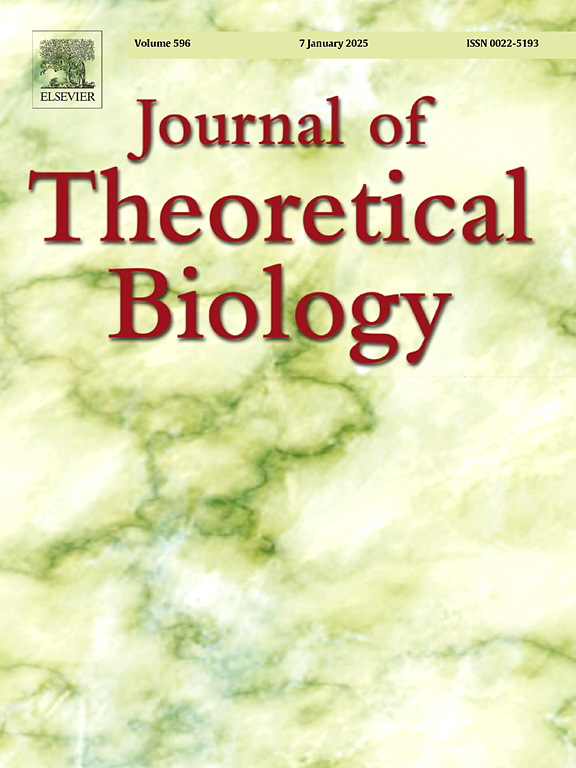Agelessness is possible under the disposable soma theory but system complexity makes it unlikely
IF 1.9
4区 数学
Q2 BIOLOGY
引用次数: 0
Abstract
Although demographic studies have failed to find evidence of aging in certain animal species, classic evolutionary theories of aging struggle to explain how evolution could favor agelessness in such cases. Here, we develop mathematical models of the disposable soma theory to identify conditions in which agelessness would be evolutionarily favored. For any given type of damage that could accumulate and cause age-accelerating mortality risk, we find that evolution could select for its complete removal if the mortality risk it poses is severe enough and its repair does not pose too large of a penalty to reproduction. Environmental factors such as extrinsic mortality and the form of population density-dependent regulation also play a large role in determining the optimal rate of aging and whether agelessness should be evolutionarily favored. However, in a system with multiple sources of damage and multiple independent repair processes, avoiding aging is rarely evolutionarily favorable. Pleiotropic repair processes, such as those that could be present in asexual fissioning organisms, make agelessness more likely but do not guarantee it. Our results indicate that agelessness could be favored by evolution in narrow contexts but that multiple types of damage and repair make agelessness unlikely to arise in sufficiently complex organisms.
根据可抛弃的肉体理论,永恒是有可能的,但系统的复杂性使其不太可能实现。
尽管人口统计学研究未能在某些动物物种中发现衰老的证据,但经典的衰老进化理论却很难解释在这种情况下进化如何有利于无老化。在这里,我们建立了一次性体细胞理论的数学模型,以确定在哪些条件下进化会有利于无老化。我们发现,对于任何一种可能累积并导致年龄加速死亡风险的损伤,如果其造成的死亡风险足够严重,且修复损伤不会对繁殖造成太大的惩罚,那么进化就会选择完全清除损伤。环境因素(如外在死亡率和依赖种群密度的调控形式)在决定最佳衰老速度和进化是否倾向于无老化方面也起着重要作用。然而,在一个具有多个损伤源和多个独立修复过程的系统中,避免衰老在进化上很少是有利的。多源修复过程(如无性裂变生物中可能存在的修复过程)使无老化更有可能发生,但并不能保证无老化的发生。我们的研究结果表明,在狭窄的环境中,无老化可能会受到进化的青睐,但在足够复杂的生物体中,多种类型的损伤和修复使得无老化不太可能出现。
本文章由计算机程序翻译,如有差异,请以英文原文为准。
求助全文
约1分钟内获得全文
求助全文
来源期刊
CiteScore
4.20
自引率
5.00%
发文量
218
审稿时长
51 days
期刊介绍:
The Journal of Theoretical Biology is the leading forum for theoretical perspectives that give insight into biological processes. It covers a very wide range of topics and is of interest to biologists in many areas of research, including:
• Brain and Neuroscience
• Cancer Growth and Treatment
• Cell Biology
• Developmental Biology
• Ecology
• Evolution
• Immunology,
• Infectious and non-infectious Diseases,
• Mathematical, Computational, Biophysical and Statistical Modeling
• Microbiology, Molecular Biology, and Biochemistry
• Networks and Complex Systems
• Physiology
• Pharmacodynamics
• Animal Behavior and Game Theory
Acceptable papers are those that bear significant importance on the biology per se being presented, and not on the mathematical analysis. Papers that include some data or experimental material bearing on theory will be considered, including those that contain comparative study, statistical data analysis, mathematical proof, computer simulations, experiments, field observations, or even philosophical arguments, which are all methods to support or reject theoretical ideas. However, there should be a concerted effort to make papers intelligible to biologists in the chosen field.

 求助内容:
求助内容: 应助结果提醒方式:
应助结果提醒方式:


